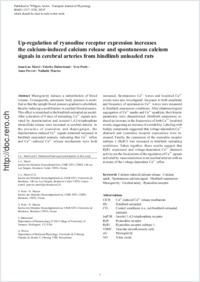Up-regulation of ryanodine receptor expression increases the calcium-induced calcium release and spontaneous calcium signals in cerebral arteries from hindlimb unloaded rats
- Morel, Jean-Luc Institut des Maladies Neurodénératives, UMR 5293, Bordeaux, France - Institut des Maladies Neurodégénératives, UMR 5293, Universite de Bordeaux, France
- Dabertrand, Fabrice Department of Pharmacology, UVM College of University of Vermont, Burlington, VT, USA
- Porte, Yves Institut des Maladies Neurodégénératives, UMR 5293, Universite de Bordeaux, France
- Prévot, Anne Department of Medicine/Physiology, Université de Fribourg, Switzerland
- Macrez, Nathalie Institut des Maladies Neurodégénératives, UMR 5293, CNRS, Bordeaux, France
-
01.08.2014
Published in:
- Pflügers Archiv - European Journal of Physiology. - 2014, vol. 466, no. 8, p. 1517–1528
English
Microgravity induces a redistribution of blood volume. Consequently, astronauts' body pressure is modified so that the upright blood pressure gradient is abolished, thereby inducing a modification in cerebral blood pressure. This effect is mimicked in the hindlimb unloaded rat model. After a duration of 8 days of unloading, Ca²⁺ signals activated by depolarization and inositol-1,4,5-trisphosphate intracellular release were increased in cerebral arteries. In the presence of ryanodine and thapsigargin, the depolarization-induced Ca²⁺ signals remained increased in hindlimb suspended animals, indicating that Ca²⁺ influx and Ca²⁺-induced Ca²⁺ release mechanism were both increased. Spontaneous Ca²⁺ waves and localized Ca²⁺ events were also investigated. Increases in both amplitude and frequency of spontaneous Ca²⁺ waves were measured in hindlimb suspension conditions. After pharmacological segregation of Ca²⁺ sparks and Ca²⁺ sparklets, their kinetic parameters were characterized. Hindlimb suspension induced an increase in the frequencies of both Ca²⁺ localized events, suggesting an increase of excitability. Labeling with bodipy compounds suggested that voltage-dependent Ca²⁺ channels and ryanodine receptor expressions were increased. Finally, the expression of the ryanodine receptor subtype 1 (RyR1) was increased in hindlimb unloading conditions. Taken together, these results suggest that RyR1 expression and voltage-dependent Ca²⁺ channels activity are the focal points of the regulation of Ca²⁺ signals activated by vasoconstriction in rat cerebral arteries with an increase of the voltage-dependent Ca²⁺ influx.
- Faculty
- Faculté des sciences et de médecine
- Department
- Département de Médecine
- Language
-
- English
- Classification
- Biological sciences
- License
- License undefined
- Identifiers
-
- RERO DOC 213287
- DOI 10.1007/s00424-013-1387-9
- Persistent URL
- https://folia.unifr.ch/unifr/documents/303701
Statistics
Document views: 57
File downloads:
- pre_urr.pdf: 165
